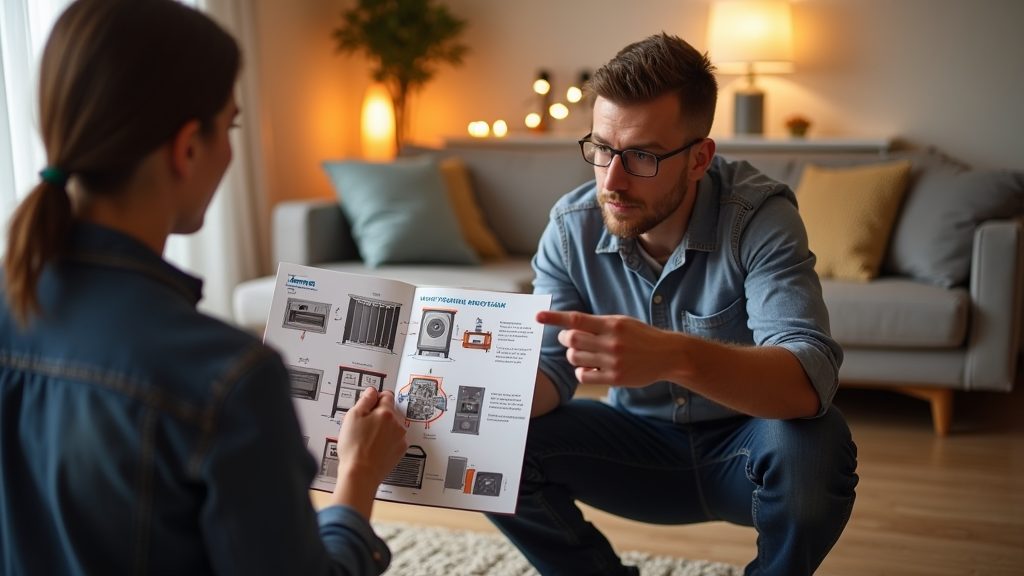When you decide to install a new heating system, it is a big task. It takes careful planning and understanding of local regulations, including installation permits. But don’t worry! We will guide you through this process step by step.
For more information on maintaining your heating system, visit our guide on regular maintenance plans to keep your system efficient.

Before you install a heating system, you need to know what type works best for your home. Here are the most common types:
Furnaces are very common in Fort Worth. They heat air and send it through ducts. They can use gas, electricity, or oil as a fuel source. If you choose furnace installation, make sure to consider the size of your home. A furnace is a key part of central heating systems, providing warmth throughout your space. Proper system design is essential to ensure that the furnace fits well with your home’s layout. There are different furnace types to consider, including gas, electric, and oil furnaces, each with its own benefits. Additionally, consider the impact of your heating choices on your carbon footprint. Choosing an efficient furnace can help reduce your environmental impact. If you ever need a furnace replacement, knowing your options will help you make a better choice. Also, remember to perform load calculations to find the right size for your furnace.
Heat pumps are popular too. They can both heat and cool your home. They move heat from one place to another. In winter, they bring heat from outside into your home. A heat pump can be a great choice for energy efficiency, helping to lower your energy bills. An energy audit can help you determine if a heat pump is the right fit for your residential heating needs. Understanding heating efficiency is important when selecting a heat pump, as some models can be significantly more efficient than others. This can also lead to cost-saving measures over time. Local heating experts can provide a professional assessment to help you choose the best system for your needs. When comparing heat pumps vs furnaces, consider your specific heating needs and the layout of your home. Look for the best brands that offer reliable heat pumps to ensure you get a quality product.
Boilers heat water to provide heat. They work well for larger homes and can also supply hot water. If you are considering boiler installation, think about how much hot water you need. Boilers can also be part of a zoned heating system, allowing you to control temperatures in different areas of your home. Proper insulation can enhance the effectiveness of a boiler system. A heat loss calculation can help you determine the right boiler size for your home. For those looking for environmentally friendly heating options, modern boilers can be a great choice.
| Heating System | Efficiency Rating | Average Cost | Ideal for Home Size |
|---|---|---|---|
| Furnace | 80% – 95% | $3,000 – $7,000 | 1,500 – 3,000 sq ft |
| Heat Pump | 200% – 400% | $4,000 – $8,000 | 1,200 – 2,500 sq ft |
| Boiler | 85% – 90% | $3,500 – $6,500 | 2,000+ sq ft |

You need to consider several factors when picking a heating system for your home.
Make sure the system you choose fits your home’s size. A system that is too small won’t heat your home well. One that is too big will waste energy. This is true for all heating units, including furnaces and heat pumps. A professional installer can help you determine the right size for your home heating needs. They can also assist with the installation process to ensure everything is done correctly. This includes understanding the project timeline to avoid delays. If you are considering DIY heating solutions, be cautious, as improper sizing can lead to inefficiency and installation mistakes. Load calculations are essential to ensure you select the right size for your heating system.
Look for energy-efficient models. They save you money over time. You can check the Energy Star rating to help you choose. Ductless heating systems can also be very efficient. Choosing a system with high energy efficiency can significantly reduce your energy bills. An energy audit can help you identify areas where you can improve efficiency. Additionally, consider installing a smart thermostat to optimize your system’s performance and further enhance heating efficiency. This can also help reduce your carbon footprint. Local heating experts can guide you in selecting energy-efficient systems that fit your needs. You can also follow some energy-saving tips to maximize your system’s performance.
Consider your budget. Some systems cost more to install but save money on energy bills later. Remember that furnace installation and boiler installation can vary in price. Understanding the installation cost upfront can help you make a better decision. Reading customer testimonials can also provide insight into the value of different systems. Don’t forget to ask about the financing options available for your new heating system, as this can protect your investment. If you face an emergency heating situation, knowing your options can save you time and money. You can also look into utility rebates that may be available for energy-efficient upgrades.
Now that you know what system you want, it’s time to find the right team for installation. In Fort Worth, look for companies with good reviews and experience.
Make sure the team is certified and trained. They should be familiar with local building codes and local regulations. This is especially important for HVAC work. Hiring a licensed contractor ensures that your installation service meets all safety and quality standards. Compliance with local regulations is crucial for a successful installation. A qualified heating technician can also provide valuable advice on environmentally friendly heating options, including heat recovery systems.
Get reviews from past customers. This gives you an idea of their work quality. A good team will have experience with various heating units. They should also be knowledgeable about energy efficiency and how it impacts your home heating. Checking customer testimonials can help you find a reliable team. Customer satisfaction is key, so look for teams that prioritize it.
Once you choose a team, set a date for installation. Early fall is a great time in Fort Worth. This way, you will be ready before the cold winter hits.
Sometimes, installation can take longer than planned. Make sure to have a flexible schedule to accommodate any changes. This is important for all types of heating system installation.
If you have a system that needs ducts, you will need to install them. Proper ductwork is vital for a heating system to work well.
If you already have ducts, check their condition before installation. Old or damaged ducts can lose heat. This can affect the performance of your heating units. Ensuring your ductwork is in good shape is essential for maintaining energy efficiency. Proper ventilation is also crucial for optimal heat distribution. Good air flow is necessary for your heating system to operate effectively. This is especially important for maintaining good air quality in your home.
If you need new ducts, make sure they are properly sized and sealed. Leaky ducts can waste energy and make your system work harder. This is crucial for both furnace and heat pump installations. Good ductwork design can improve the overall efficiency of your heating system. A well-designed heat exchanger can also enhance performance.
If you choose a furnace, the next step is connecting it to your home. This is key for efficient heating.
The furnace should be located in a place that allows for good airflow. Basements or utility rooms are common choices. Proper placement is essential for effective furnace installation. It also helps with ventilation, ensuring that your home stays comfortable.
Ensure your furnace has proper ventilation. This is important for safety and efficiency. A good smart thermostat can help manage the temperature effectively. Proper ventilation also helps maintain good indoor air quality.
After installation, it’s time to check everything. Make sure all parts are working well.
Your installation team should run tests. They need to check that the system heats your home properly. This includes checking the thermostat settings. You can also ask for a system evaluation to ensure everything is functioning as it should.
Make sure the area is clean. A good team will clean up after themselves.
Once everything is checked, turn on your new heating system. Monitor it for a few days to ensure it works smoothly. If you have a radiant heating system, check for even heat distribution.
After installation, it’s important to take care of your heating system. Regular maintenance will help it run efficiently. Here are some heating maintenance tips to keep in mind.
Have a professional check your system at least once a year. This will help catch any issues early. Regular maintenance is key for all heating units. A licensed contractor can provide the necessary installation service and ongoing maintenance. You can also create an installation checklist to keep track of what needs to be done.
Change or clean your filters every month. Dirty filters make your system work harder and can reduce its lifespan. This is especially important for HVAC systems.
| Task | Frequency | Impact on System Performance |
|---|---|---|
| Change filters | Monthly | Improves airflow |
| Inspect ducts | Annually | Reduces leaks |
| Professional tune-up | Annually | Enhances efficiency |
The cost of installing a heating system can vary. It depends on the type of system, the size of your home, and any additional work needed. Getting cost estimates from different contractors can help you make an informed decision.
In Fort Worth, the cost of a new heating system can range from $3,000 to $7,000. This includes installation, equipment, and any necessary ductwork. Keep in mind that costs can differ for furnace installation versus boiler installation. Understanding the installation cost can help you budget better.
If the cost is high, consider financing options. Many companies offer plans that let you pay over time. This can make it easier to afford a new system. You might also qualify for utility rebates that can help offset some of the costs.
When it comes to heating system installation in Fort Worth, remember that preparation is key. Know what type of system suits your needs. Choose a qualified team and stay on top of maintenance.
Your comfort is important, and a good heating system will ensure your home stays warm when it’s cold outside.
If you need help with heating system installation or other HVAC services, contact Prestige Air today. We are here to help you stay comfortable all year round! For more related services, check our page on heating services for all your HVAC needs.